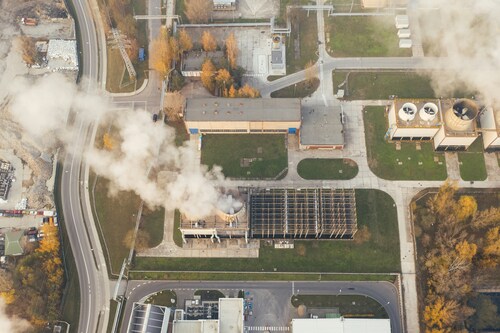Heavy manufacturing sectors such as steel, cement, and chemicals contribute substantially to global carbon emissions. With sustainability becoming increasingly important, these industries are implementing advanced technologies to reduce emissions while maintaining efficiency. Various solutions, including carbon capture and the incorporation of renewable energy, are facilitating the shift toward a low-carbon future.
Carbon Capture, Utilization, and Storage (CCUS)
Carbon capture, utilization, and storage (CCUS) technology stops carbon dioxide (CO₂) emissions from being released into the atmosphere by capturing them directly at their source. The collected CO₂ can be either stored permanently underground or transformed for use in industrial applications like fuel production or concrete manufacturing. Advances in this technology are enhancing its accessibility and affordability, promoting broader implementation in sectors that produce significant emissions.
Hydrogen as a Clean Energy Source
Hydrogen is becoming a prominent alternative to fossil fuels in industrial processes. Green hydrogen, generated through renewable energy and water electrolysis, is particularly encouraging as it produces no emissions during its use. It has the capability to substitute coal in steel manufacturing, act as a feedstock in the chemical industry, and energize manufacturing facilities. With rising investments in infrastructure, hydrogen is anticipated to take on a more significant role in the decarbonization of industry.
Electrification of Industrial Processes
Many industries heavily rely on fossil fuels for heat generation, which leads to significant emissions and environmental degradation. However, a transformative shift toward electric-powered systems—especially those utilizing renewable energy—offers a promising and sustainable alternative. Innovative technologies such as electric furnaces, induction heating, and industrial heat pumps are emerging as effective solutions for energy efficiency. These advanced systems not only alleviate the environmental burden but also reduce our dependence on carbon-heavy fuels. As renewable energy sources become increasingly available, the electrification of industries is poised to gain momentum, paving the way for a cleaner and greener future.
Enhancing Energy Efficiency
Optimizing energy use is one of the most cost-effective ways to reduce emissions. Businesses are increasingly adopting AI-driven monitoring systems, smart grids, and automation to minimize energy waste. Waste heat recovery and process optimization technologies also allow industries to reuse excess energy, cutting emissions and operational costs.
Bio-Based and Circular Economy Solutions
Replacing fossil-based raw materials with bio-based alternatives is another effective strategy. Biofuels, bioplastics, and plant-derived feedstocks are gaining traction as viable substitutes. Adopting circular economy principles—such as recycling, repurposing waste materials, and improving supply chain sustainability—further contributes to reducing emissions by minimizing resource consumption. The best decarbonisation option integrates multiple technologies to help industries effectively cut emissions while maintaining productivity.
The Future of Industrial Decarbonization
The transition to low-carbon industrial operations demands technological innovation, robust policies, and strategic financial investments. Companies embracing this shift will not only meet evolving environmental regulations but also gain a competitive edge in a sustainability-focused market.
Advancements in Carbon Capture, Utilization, and Storage (CCUS), hydrogen energy, and electrification enable significant carbon emissions reductions. By integrating these technologies, businesses can align ecological responsibility with profitability, paving the way for a cleaner, more efficient future. Leaders in this transition will redefine success and set new standards for industrial operations, inspiring positive change worldwide.




